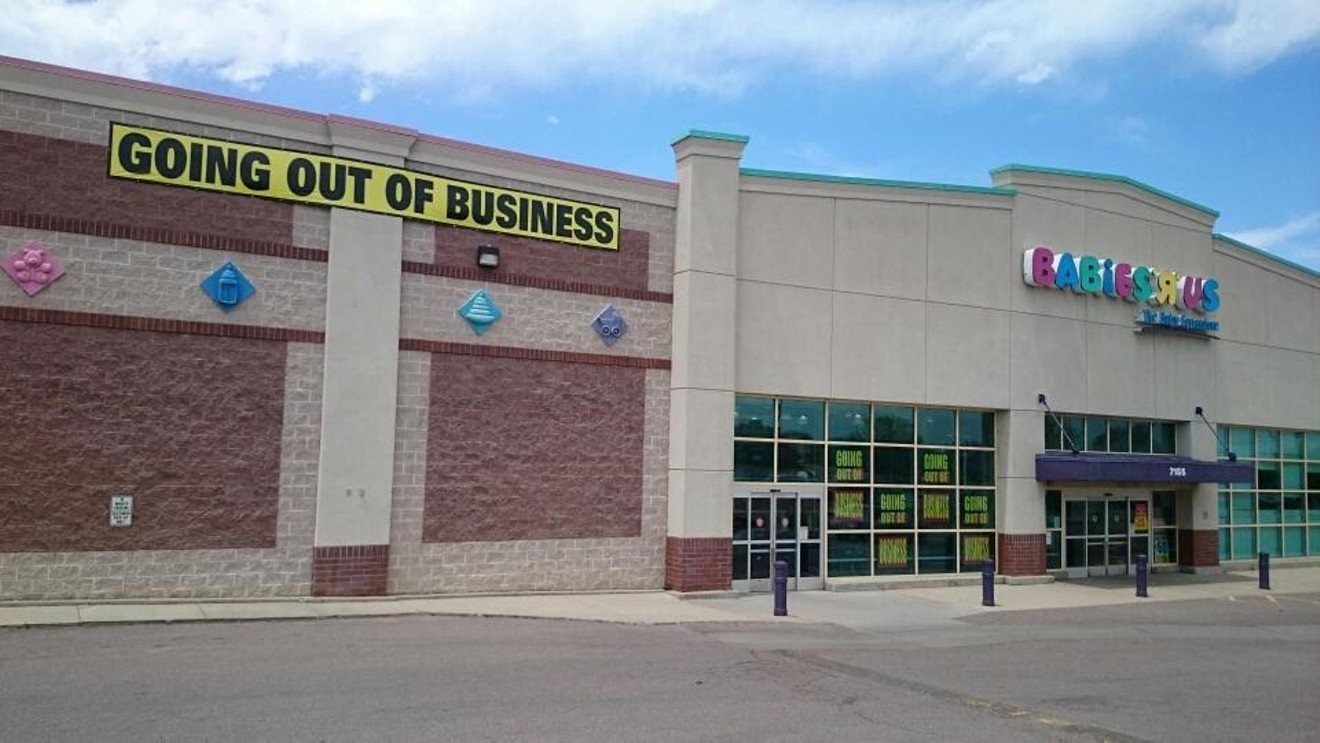One look at the cranes visible along Denver's skyline is all it takes to prove that development in the Mile High City continues to move at an incredible pace.
Yet there's a big exception to this rule: Dozens upon dozens of former big-box store locations remain vacant throughout the metro area, including numerous spaces opened up by Sports Authority's 2016 bankruptcy that have been collecting dust ever since. And the impending closures of Toys "R" Us and Babies "R" Us affiliates in the area, not to mention the announced September shutdown of a Kmart in Arvada (part of nationwide downsizing by the beleaguered Sears Holdings Corp.) will only add to this total.
Given the move away from brick-and-mortar retail outlets, particularly enormous ones, and the growing popularity of online shopping, will these box stores ever be filled? Courtney Key, a partner at Sullivan-Hayes, a real estate brokerage whose specialties include shopping centers, is confident most will — or else they'll be wiped off the face of the Earth to make room for structures that make more sense in today's economic environment.
"I'm working on a number of Sports Authority boxes, on the landlord and tenant side, and I also have some Toys 'R' Us boxes," Key points out. "Every couple of years, you have opportunities like these in real estate, where you have a tenant who goes bankrupt. That's not good for those tenants or their landlords, but it's a new opportunity in the marketplace."
It's also a challenge, even for someone as plugged in as Key. She notes that "REI took the Sports Authority on I-25 off Arapahoe." But with so many boxes becoming available at the same time and a relative dearth of new retailers eager to take on such cavernous edifices (most Sports Authority stores measure around 50,000 square feet, with Toys "R" Us affiliates typically hitting 65,000 square feet), she's looking toward entrepreneurs with a different business plan.
"A lot of the Toys and Sports Authority boxes are being converted to entertainment spaces, which is an Amazon-proof model" — by which she means that "these places are experiential. Bowling alleys, trampoline centers, event centers, movie theaters: It's sort of the Dave & Buster's concept. And I think it's actually a unique opportunity to revitalize some of these power centers, where you might replace a business that's maybe less of a traffic generator with something that could really energize a whole shopping complex."
Problem is, no area can support an infinite number of Jump Streets. Key acknowledges that "the boxes won't all go to entertainment users. But discount retailers like T.J. Maxx and Home Goods are another active category. Those are tenants whose customers have more of a treasure-hunt mentality. Their prices are low and they change inventory a lot, so it's a shopping experience you can't duplicate online. We're also seeing interest from specialty grocers and large-format fitness centers, like 24 Hour Fitness, that have recently expanded. Those kinds of places have taken a lot of the old Safeway and Sports Authority boxes, and I'm sure they'll take some of the Toys boxes, too."
Other options include "restaurant activity and medical — services that offer things that people have to go and do."
As for boxes that sit vacant too long, landlords may reluctantly have to split the stores into smaller spaces. That's appealing to retailers, Key believes, "because they're being forced to right-size and be more competitive. Their merchandise has to be stronger, their customer service has to be more effective, and they have to figure out a way to be ecommerce-proof. Usually, they'll have some sort of online presence that helps them operate in smaller square footage."
What if that doesn't work, either? Then owners will have to make tough choices.
"Landlords are having to spend a lot of money to not even replace the rent they were getting from the previous tenants," Key says. "That's a negative and a hit, especially if the real estate at some of these boxes isn't as good, like with some of the Kmarts."
In circumstances like those, she allows, "we're seeing the stores being scraped for multi-family, alternative-land uses." She cites the Kmart at Alameda and Broadway, which was demolished in favor of an apartment complex.
Which will replace one big box with a lot of little ones.
[
{
"name": "Air - MediumRectangle - Inline Content - Mobile Display Size",
"component": "12017618",
"insertPoint": "2",
"requiredCountToDisplay": "2"
},{
"name": "Editor Picks",
"component": "17242653",
"insertPoint": "4",
"requiredCountToDisplay": "1"
},{
"name": "Inline Links",
"component": "18838239",
"insertPoint": "8th",
"startingPoint": 8,
"requiredCountToDisplay": "7",
"maxInsertions": 25
},{
"name": "Air - MediumRectangle - Combo - Inline Content",
"component": "17261320",
"insertPoint": "8th",
"startingPoint": 8,
"requiredCountToDisplay": "7",
"maxInsertions": 25
},{
"name": "Inline Links",
"component": "18838239",
"insertPoint": "8th",
"startingPoint": 12,
"requiredCountToDisplay": "11",
"maxInsertions": 25
},{
"name": "Air - Leaderboard Tower - Combo - Inline Content",
"component": "17261321",
"insertPoint": "8th",
"startingPoint": 12,
"requiredCountToDisplay": "11",
"maxInsertions": 25
}
]














